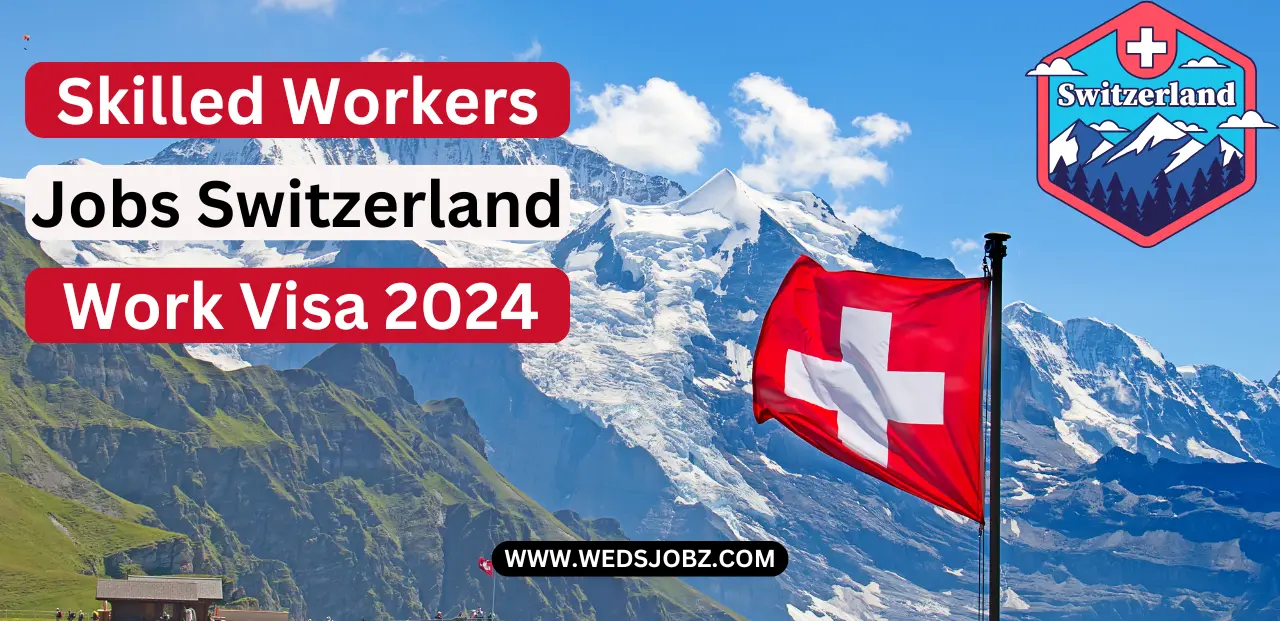Switzerland is facing labor shortages in 41 jobs, according to the 2024 EURES report. The sectors most affected include healthcare, engineering, IT, education, and justice. The report also highlights that Switzerland relies heavily on foreign-trained doctors and nurses.
In 2024, the labor market in Switzerland presents both challenges and opportunities. The country is experiencing shortages in key industries, a problem that has grown over time. This guide offers current information on the labor market, average salaries, the industries most impacted, required qualifications, and the process for obtaining a work visa in Switzerland.
Also Apply: UK Work Visa Jobs Oct 2024 (£19.23 Per Hour)

Job Details
Here’s a table with job details in Switzerland in 40 words:
| Sector | Job Details |
|---|---|
| Healthcare | Significant shortages in doctors and nurses, requiring foreign-trained professionals. High demand for skilled healthcare workers. |
| Engineering | Engineers, especially in fields like civil, mechanical, and electrical, are in high demand. |
| IT | Strong demand for IT professionals, particularly software developers, cybersecurity experts, and data analysts. |
| Education | Teachers, especially in specialized fields, face shortages. Education sector needs skilled educators. |
| Justice | Legal professionals such as lawyers and judges are needed due to rising demand. |
List of Jobs
Here’s a simple list of available jobs in Switzerland:
Environmental Engineers
Environmental engineers do the following: create, review, update, and present reports on environmental issues. They design systems to protect the environment, such as those for cleaning water or reducing air pollution. They also manage plans, permits, and safety procedures.
Agricultural Technicians
Agricultural technicians have various tasks: they study ways to improve crop and animal productivity. They use lab equipment and collect samples from crops or animals to check for diseases or confirm experiments. They also do farm work and keep records.
Judges and lawyers
Judges give instructions to juries before they discuss a case. In bench trials, where there’s no jury, judges review the facts and make a decision. Judges are also responsible for sentencing people who are found guilty of crimes. Most cases are decided by a jury.
Computer network experts
A laptop network expert installs, troubleshoots, and maintains computer networks. They work with both the hardware and software of the network, ensuring everything runs smoothly with as little downtime as possible.
Systems administrators
Device directors, also known as sysadmins, help fix, support, and maintain computer servers and networks. They are IT experts who ensure that a company’s computer systems are working properly and meet the needs of the business.
Database Designers and administrators
Database Architects and Database Administrators (DBAs) both work with data, but their jobs are different. Database Architects design and build the databases, while DBAs handle daily maintenance and ensure the databases run smoothly.
Programmers
Software programmers write the code for programs used in computers and other devices. They create software by writing clean, error-free, and easy-to-update code. They also test, analyze, and improve applications to make them easier for users to use.
More Details: Europe Jobs

Benefits
- In Switzerland, workers who are employed for at least a year are entitled to at least 4 weeks of paid vacation per year, which increases to 5 weeks for workers over the age of 20. Vacations can be taken separately or together, and employers cannot make workers take their vacation at a specific time.
- Pregnant employees are entitled to 14 weeks of paid maternity leave, during which they receive 80% of their regular salary, up to 196 CHF ($212) per day, or about $20,776 in total. Fathers are entitled to 2 weeks of paid paternity leave within six months of their child’s birth. Paternity leave benefits are the same as maternity benefits, at 80% of the father’s regular pay, capped at 196 CHF per day, or about $3,000.
- Employees can take up to 14 weeks of childcare leave to care for sick or injured children, with benefits paid through social security. Additionally, workers are entitled to 3 days of mandatory childcare leave at a time, with a maximum of 10 days per year, to care for sick children.
- Employers in Switzerland must contribute to social security for their employees, with rates varying by region, ranging from 9.46% in Geneva to 23.4% in Zurich. These contributions cover pensions, unemployment insurance, disability, and work-related injury insurance.
- Switzerland does not have a national minimum wage, and wages are generally determined through collective bargaining. In the last decade, the lowest wages in Switzerland ranged from 19 CHF ($20.64) per hour in Ticino to 23 CHF ($25) per hour in Geneva, the highest in the country.
- Swiss labor law distinguishes between regular overtime and extra hours. Overtime refers to any time worked beyond the hours stated in the employment contract, while extra hours are any time worked beyond the government’s maximum of 45-50 hours per week. Overtime and extra hours must be compensated with time off or a 25% premium on top of the worker’s usual pay.
Conclusion
Switzerland has a two-part system for allowing foreigners to work in the country. The first part applies to residents of the European Union (EU) and the European Free Trade Association (EFTA). The second part is for workers from other countries, known as third states, and they are allowed entry in limited numbers.
Also Apply: Part-Time Jobs in UK for Students 2024
FAQs
Who can work in Switzerland under the first system?
Residents of the European Union (EU) and the European Free Trade Association (EFTA) can work in Switzerland under the first system.
What is the second system for working in Switzerland?
The second system is for workers from countries outside the EU and EFTA, known as third states. These workers are allowed entry into Switzerland, but in limited numbers.
How does Switzerland control the number of workers from third states?
Switzerland limits the number of workers from third states allowed to enter the country, based on specific quotas.








